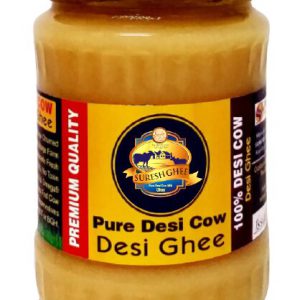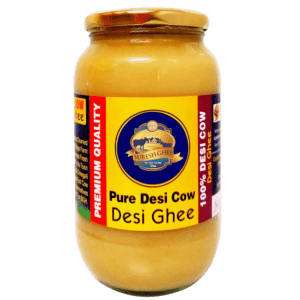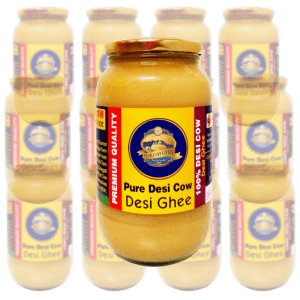Benefits of Desi Ghee:
- Acts as brain tonic : Ghee is good for the nerves and brain. It contains Omega-6 fatty acids and high levels of Omega-3 fatty acids, which is ideal for overall health. In addition, low intake of these acids unmattata and increased the risk of Alzheimer’s. Therefore, includes the regular use of butter in your diet can help your brain work better.
- Prevents cancer : Although ghee is high in saturated fat, it is ideal for cooking Indian food, because it has a high smoke point (i.e. it doesn’t burn very easily). That means, it produces free radicals when hot, which increase your cancer risk. It is also rich in antioxidants which in turn protects from free radical damage to you.
- Aids digestion : Ghee helps in the secretion of stomach acids that aid digestion. Celebrity nutritionist Rujuta Divekar in his series “Indian Food Wisdom and the Art of Eating Right” highlights the fact that some foods such as kshidi , puranpoli, etc. require ghee to digest better.
- Used as a natural moisturiser : Ghee is a good beauty enhancer. If you have chapped lips, drop of ghee on them before going to bed is a good remedy. In Ayurveda, ghee mixed with water by stirring moisturizing agent is used. Ghee can be used before the process is repeated several times. And once made, you use it regularly can store six months.
- Melts stubborn fat : If you have a problem in the areas where fat is accumulated quickly, consider adding melted butter (Desi Ghee) in your diet. Rujuta explains, ‘are essential amino acids in butter which help mobilize fat and fat cells size allowed to be deleted.
- Natural Remedy for Joint Pain : Ghee is also good for people suffering from joint pain. It also improves your memory and vision power powerful antiviral and antifungal properties and it strengthens the immune system.
- Stable for cooking: High smoke point of desi ghee makes it stable for cooking. It is excellent for frying and sautéing.
- Ghee provides Vitamin K : Grassfed ghee contains the highly elusive nutrient vitamin K2. Vitamin K2 is the shuttle than transports calcium into your bones. You can eat as much calcium as you want but it won’t strengthen your bones unless it is accompanied by vitamin K2. (Source: Vitamin K2 and the Calcium Paradox.) As a fat-soluble vitamin, it requires the fatty acids in ghee for absorption.
- Ghee is a source of butyric acid : Ghee contains a significant level of butyric acid, an anti-carcinogenic short-chain fatty acid. Butyric acid has been shown to inhibit the growth of mammary tumors.
Butyric acid is also a biological response modifier, a substance that arouses the body’s response to infection. Studies show that it boasts numerous healing and soothing properties on the intestinal tract (source, source). Some strains of beneficial gut flora produce butyric acid, and research shows the butyric acid produced may be a potential treatment for Irritable Bowel Disease. - Controls Blood Sugar Levels : The glycemic index illustrates how rapid and how high a food combination makes the blood sugar levels increase. Those people who are suffering with diabetes require to intake food with a minimal glycemic index. Such foods that have a high GI can lead to major issues including both long-term and short-term time span for someone who is suffering from diabetes. Ghee works likewise, adding ghee to meals has shown to decrease the complete glycemic index of the food. It helps regulate blood sugar levels. Hence, such foods that would lead to an increase in the sugar levels would now be controlled.
- Provides Warming Effect : Consumption of ghee poses multiple health benefits, involving the ability to provide warmth to the body. Ghee has the distinct property of providing a calming and warming effect on the body when consumed moderately. According to Ayurvedic studies, ghee is renowned as a “heating” food as it regulates the digestive fire which is known as Agni. A healthy Agni is necessary for consistent nutritional digestion and absorption, which constantly supports the body’s metabolic functions. Ghee supports in production and balancing the internal heat and enhances complete warmth in the body by improving Agni.
- Prevents From Cold : Ghee is considered to leave a balancing effect on the Vata dosha, among one of Ayurveda’s three doshas renowned as a bioenergetic force. Vata is connected to coldness, aridity, and insecurity. Intake of ghee supports to balance Vata and provides the body a sense of warmth and stability. Furthermore, ghee provides warmth on the inside by nourishing you, improving
Add Ghee to your food
- Make it your primary cooking fat for sautéing
- Swap it for butter for spreading on baked goods
- Toss steamed vegetables with ghee and sea salt
- Use it in any recipe that calls for cooking oil
- Use it in place of coconut oil or palm oil for baking
- If roasting vegetables, you can melt ghee and then drizzle it on like olive oil before baking
Desi Ghee ( clarified butter), which has been an essential part of Indian cuisine. We have been using ghee since 2000BC or before that also. However, few people who cannot actually control the intake of it consider it unhealthy since it is oil ( butter oil). While if you control the intake of pure desi cow ghee in your daily food you can have many health benefits.
What exactly is Ghee?
Ghee is basically butter oil obtained from butter. However, the pure desi ghee is one which we obtained from grass-fed cow’s milk by traditional ghee making process. In the traditional ghee making process – first we boil the milk till it changes its colour and after it cools down, we make curd out of it. This curd is then churned with the help of wooden churners to obtain unsalted butter.
Finally, the cultured butter gets boiled on high flame and impurities get removed to have golden oil – which is called Desi Ghee. This ghee can be preserved for more than one year without refrigeration if stored well.
How can you include ghee in your food?
Ghee has been an important part of Indian kitchens since time out of mind. Its benefits are well-known to Indian houses, and it’s also said that desi cow ghee has immense significance in Ayurvedic medicines and remedies.
1. Spread It on chapatis
Yes, it’s time to eat ghee smeared on our chapatis, but be mindful of the portion. Brushing with ghee on chapattis helps improve the digestibility of chapati and even brings down the glycemic load of the chapatti.
2. Tadkas in dals
Tadka is an important part of our dal preparations; they assist add flavor to soaked lentils. Ghee’s use of tadka not only increases the flavor of the dish but also adds a tinge of health to it.
3. With milk
A glass of milk with a spoonful of ghee could be an effective solution for constipation, written by Dr. Vasant Lad’s name of the book is” The complete book of ayurvedic home remedies”.
4. Ghee use to cook veggies
Cooking your veggies in ghee might be another healthy move you’ll try. Ghee features a high heat point, it’s effective for absorption of fat-soluble nutrients found in veggies; lycopene in tomatoes is more easily available to the body if they are cooked in ghee. Vitamin A from vegetables like carrots and green soups is easy to intake if they are cooked in ghee.
5. Fortifying Ladoos
Gond ladoo, Almond laddoo, and more, all these delicious and nutrition-dense laddoos are mostly made with ghee. Since these ladoos are on a heavier side, it’s recommended to not go overboard.







 WhatsApp us
WhatsApp us
Naveen m...